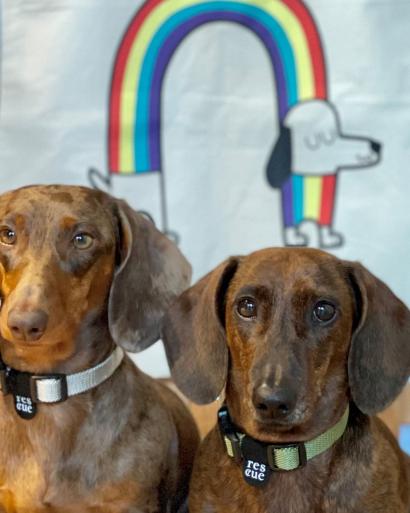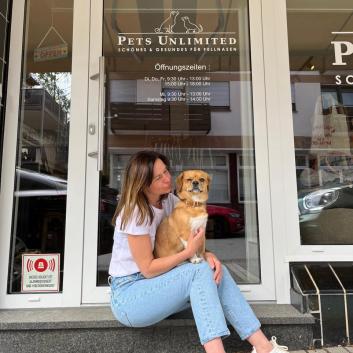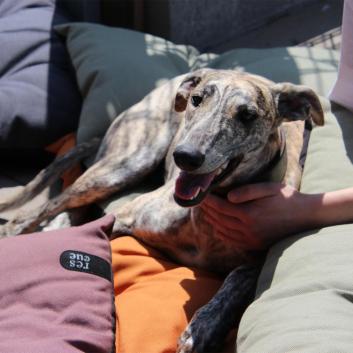TOGETHER FOR RESC7UE - An interview with Petra from Lucka – Feines für den Hund in Germany
1. Petra, through your specialty store Lucka – Feines für den Hund in Germany, you deal with dogs on a daily basis. Why is the topic of rescue dogs especially close to your heart?
My idea for a specialty store for dogs first began with the adoption of my German shorthair pointer Mara from a Spanish rescue organization. She showed me special gratitude and love, which led to the creation of a strong bond between us. Without Mara’s adoption, I would not be where I am today. The joy I had with her and her with me, I wanted to pass on to other dogs in desperate situations at the shelter. Through in-person and online fundraisers on our online shop www.lucka.dog, I was able to do a small part to help improve the life of neglected dogs. The animal organization itself is so crucial to the welfare of the dogs and other animals, as they not only rescue but care for them as well as prep them for adoption.
2. When we asked you which animal organization you would like to support as part of our TOGETHER FOR RESC7UE initiative, you suggested Pro Hund Andaluz e. V.. What makes this organization in particular so special for you?
I got to know Pro Hund Andaluz e. V. through the little doll and the organization’s mascot "Esperanza". She is handcrafted voluntarily by members. The proceeds are then used to finance the construction of an animal protection farm in Jaén (Spain). I am also selling the "Esperanza" in store. Pro Hund Andaluz e. V. works with very personally committed volunteers to support the Spanish animal association Abyda in Jaén. Their main goal is to improve the situation onsite in Jaén and to support the Spanish team with donations in materials and money but also personal contribution. With all these means, the education of the Andalusian population and the veterinary care up to the castration is financed. These are goals that I consider very important to help the dogs in Andalusia. Dogs are also placed in new homes, but the focus of the work is the help onsite in Jaén.
3. To the best of your knowledge, what is the difference between the specific situation of street dogs in Spain and in those in other countries?
The goal of Pro Dog Andaluz is not only to improve the lives of neglected dogs and cats from the Jaén region. Rather, the goal is to reduce the number of abandoned animals step by step. To achieve this, the staff of Pro Dog Andaluz uses informative campaigns, public demonstrations, and regular meetings with politicians to improve the overall situation of the animals in the Jaén region. Although the first successes are showing, it is only possible in small steps to get the population and the politicians to rethink. In some regions of Spain, spaying and neutering programs for street animals are not as widespread as in other EU countries. This often leads to uncontrolled reproduction of street dogs in the country. Animal welfare organizations in Spain are working diligently to improve conditions for stray animals and raise awareness of animal welfare issues, while overcoming challenges that are specific to the region. Many dogs in Spain are brutally tortured when they don't "work" and left to fend for themselves after the hunting season. The animal welfare law in place there is totally outdated and non-compliance is almost never punished.
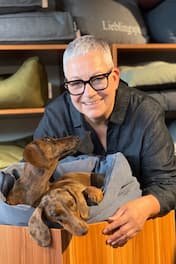
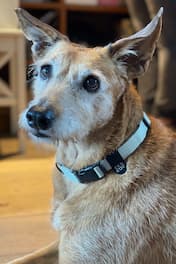
4. You have mentioned that you have personally owned shelter dogs. Tell us a little about them and your experiences.
My German shorthair pointer Mara was a victim of the end of hunting season 2001 in Spain. Mara was the beginning of my love for dogs. She stayed by my side every day for 14 years. When she came to me, she was a worn-out skinny 12kg dog, weighing 23kg in her best years. Suffering from leishmaniasis, with a heart defect, kidney failure and incontinent due to neutering, she was, despite everything, my soul dog who enriched every day. The English pointer Zino was a victim of the hunting season end 2005 in Portugal. He came to me in 2010 after having several previous owners and being in a few foster homes. He was fearful of men and anything stick-like. Since he was highly sensitive and a hunting dog, our beginning was not easy for me. Unfortunately, he fell ill with leukemia in 2015 and I had to say goodbye to him within a week. I loved the little sensitive guy with all his quirks. Mara and Zino were both family members who enriched my life. With them emerged my love for hunting dog breeds. Today I am accompanied by three shorthaired dachshunds, who are not at all trained for hunting. I would not have come to the dachshund without having previously experienced the friendliness, the love for people, the attachment, the activeness of two hunting dog breeds from the shelter.
5. Rescued dogs in most cases not socialized and often have had bad experiences with people in their lives. If a dog lover is thinking about getting a dog from a shelter, what should they consider in any case?
They should think very carefully about taking a dog from a shelter. It is not so easy. There are some important things to consider:
6. Finally, a personal question: Can you tell us about a special moment or experience in your life with dogs that has had a lasting impact on your life?
In 2002, I was looking for a partner for my cat at animal shelters on the internet, as he was very much mourning my deceased cat. While searching, he became friends with the neighboring cat. At that time I saw for the first time the misery of many animals in Southern Europe. Mara was also in one of the pictures. The sight shocked me so much that I wasted no time in contacting the foster home. Two weeks later Mara moved in with me. Mara was my key to happiness, so seven years later I gave up my job as a designer and opened Lucka - Feines für den Hund in the summer of 2009.
